Brazil football: Death of a street child
- Published
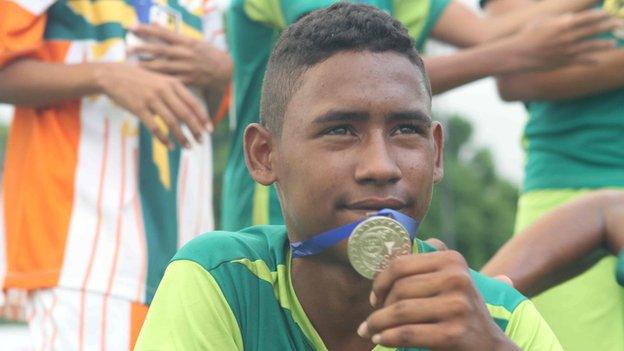
The brutal killing of a promising teenage street footballer has concentrated minds in Brazil ahead of the World Cup this summer.
"Rodrigo was nurturing the dream of being a professional footballer. He had been born with a real talent and everyone in his family and his community knew that he was really good at football."
The teenage boy described by outreach worker Antonio Carlos da Silva could be any of Brazil's football-mad youngsters.
But Rodrigo Kelton had not just stood out in training sessions. At only 14, he had already overcome great odds to make it to that age alive.
Rodrigo was one of the thousands of children born into hardship in the north-eastern state of Ceara, where according to official figures more than 133,000 people live on less than 70 reais ($30; £18.50) a month.
Perilous existences
Born into deep poverty and drug addiction, Rodrigo was driven by severe social problems into a perilous existence on the streets of the state capital, Fortaleza.
But according to Mr Silva, the outreach worker who first met Rodrigo living on the streets and persuaded him to move into a shelter in 2009, he was on the brink of turning his life around.
"He was hoping to turn professional, so that he could help his mother get treatment for her drug addiction and buy her a house," Mr Silva recalls.
Part of what helped him was being part of the Brazilian team competing in the Street Child World Cup, a global tournament that puts the spotlight on issues affecting street children.
The tournament currently under way in Rio is the second such event to be held uniting teams of street children from 19 countries, four years after the inaugural competition in Durban.
Bernardo Rosemeyer is the founder of O Pequeno Nazareno, a non-governmental organisation which runs the shelter into which Rodrigo moved aged nine. He says the prospect of competing in the Street Child World Cup instilled discipline in Rodrigo's life.
"He had stopped taking drugs and was going to school as part of the conditions to play in the tournament," Mr Rosemeyer explains. "Being in the team was a light in his life. He was even getting on better with his mother who came to all the training sessions."
Bitter reality
But what happened to Team Brazil's best striker shortly before he was due to take part in the Cup reflects the bitter reality of children at the bottom of Brazil's society.
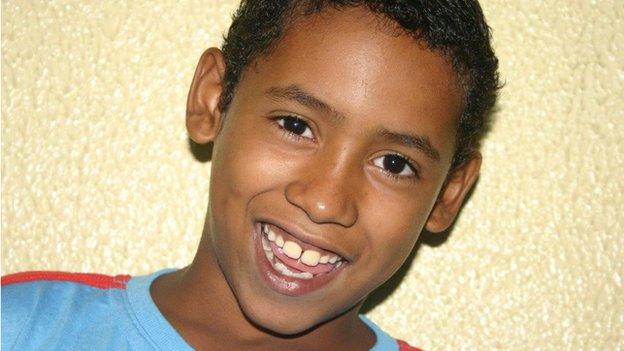
Rodrigo left the shelter and moved back with his family in a dangerous part of Fortaleza
In February, Rodrigo decided to move back to the favela, or shanty town, where his family lived.
He liked a girl there and dismissed warnings by social workers about the risks of returning to the dangerous neighbourhood.
As he left his home on the day of his 14th birthday with his older brother Raphael, the brothers were shot at by members of a drug gang in retaliation for an alleged robbery several years before.
Rodrigo was killed and Raphael only survived because the gun had jammed.
The news hit his team mates hard.
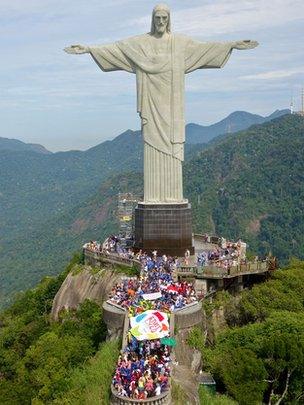
230 former street children from 19 countries gathered at the iconic Christ the Redeemer statue
"I told the players about his death when we all met up to take the bus to the training session," recalls Mr Silva.
"At first, they did not believe me and thought I was lying. Then they all began to cry and to think about their strategies for survival in the communities where they live."
At Rodrigo's funeral, it was his team mates who carried his coffin.
On the day before their first match, they gathered in a small chapel to remember the teenager who could not make the journey with them from the streets of Fortaleza to Rio to represent their country.
Goalkeeper Pedro Levi, a 15-year-old who also lived on the streets of Fortaleza before moving into a shelter, says Rodrigo has left a gaping hole in the team: "He was a great player. The best thing about him was his leadership, he would bring the whole team together.
Pedro says the team is determined to bring the trophy home "for Rodrigo".
Impunity
Before their first match against Egypt, the players observed a minute's silence in Rodrigo's honour. Team mate Diego Rocha, 14, held a portrait of Rodrigo as Rio's Archbishop, Dom Orani Tempesta, and a former captain of Brazil's national team, Gilberto Silva, watched.
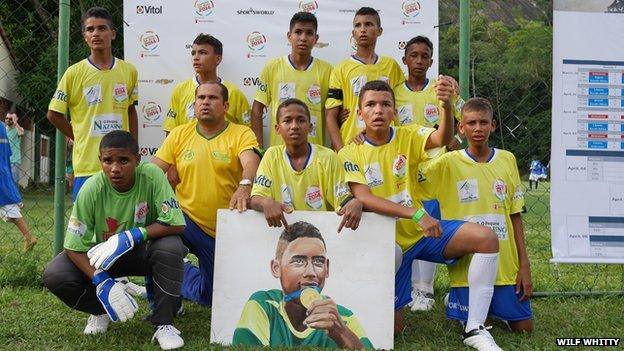
The Brazilian team hold a painting of Rodrigo by artist Carling Jackson
Rodrigo's team went on to beat Egypt 4-0. But their victory felt bittersweet. "We dedicate this match to the memory of Rodrigo," Diego said.
The team is determined that Rodrigo will not be forgotten and plan to keep displaying his portrait as they progress through the tournament to Sunday's final.
But the reality for Brazil's 23,000 street children is anything but rosy. Gang and drug violence remain endemic in poor communities.
In Rodrigo's home state of Ceara alone, there were 4,462 murders in 2013.
Murders of street children routinely go unpunished and there has been no investigation into Rodrigo's death.
Team mate Vinicius Marcos, 14, knows any of the 300 children believed to live on the streets of Fortaleza could easily run the same fate as Rodrigo.
So his hope for his former team mate is a simple one: "I hope God has him in a good place."
Related topics
- Published27 March 2013
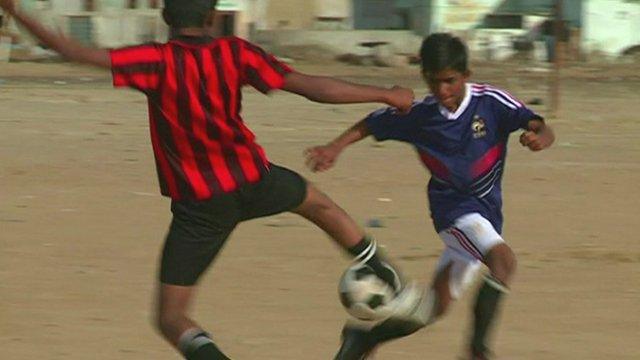
- Published28 April 2012